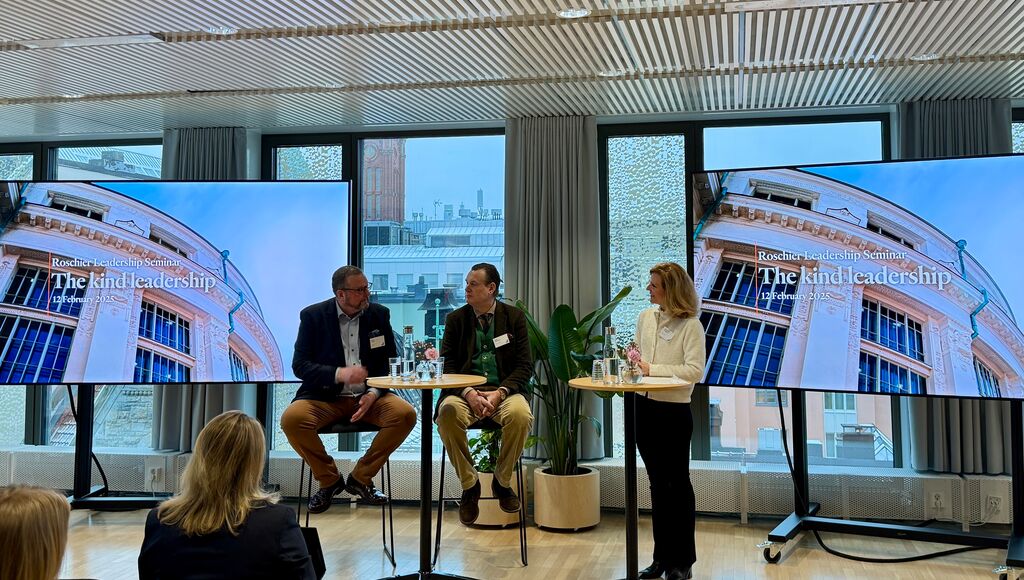
Leading with kindness: The Moomin way of leadership
Insights|February 13, 2025
At Roschier’s Leadership Seminars, we have explored a range of leadership styles – from inclusive to sustainable leadership. This time, we turned our focus to kind leadership – and what better way to explore it than through the wisdom of the Moomins?
Johanna Flythström opened the session by reflecting on past discussions, highlighting a common theme: the importance of creating environments where people feel safe. She began by quoting the Moomins – “For if you’re not afraid how can you be really brave?” – before handing over to Christina Dahlblom, Professor of Practice at Hanken, who moderated the discussion. The session featured Roleff Kråkström, CEO of Moomin Characters, whose leadership embodies values-driven management, and Janne Tienari, a professor specializing in strategy and leadership. Together, they explored what kind leadership truly means, questioning whether kindness is a personal leadership trait or a culture intentionally fostered within organizations.
What we learned:
- Kindness isn’t a daily decision – it’s a culture. Leaders don’t simply wake up and decide to be kind; they create environments where kindness naturally flourishes.
- Friction is not failure – it’s fuel. The Moomin team embraces disagreements and debates, understanding that tension leads to better decisions. Kind leadership doesn’t mean avoiding conflict; it means approaching it with respect.
- Manage imperfection, don’t strive for perfection. Leadership isn’t about control – it’s about making space for the right things to happen and about managing imperfection.
Roleff described his view on kind leadership, emphasizing that it’s not about being overly soft or agreeable. Instead, he pointed out that kindness is rooted in respect, both given and received. He referred to The Invisible Child, a Moomin story in which a mistreated girl becomes invisible until she is brought to the Moomin house by Too-Ticky and treated with respect and firmness – demonstrating that kindness is about empowerment. In leadership, kindness means recognizing people’s strengths, placing them in roles where they can succeed, and holding them accountable. It’s not about shielding people from challenges but about fostering an environment where they can grow and contribute meaningfully.
Janne spoke about his experiences coaching a basketball team and noted that while teams have heroes, it’s not the heroes who win – teams win. True kind leadership, he explained, is about designing systems and structures where people can thrive, rather than making leadership about one person’s actions. This means ensuring psychological safety within an organization, where employees feel secure enough to take risks and contribute without fear.
Roleff had a slightly different perspective. He emphasized that a leader must be willing to burn themselves and not take themselves too seriously. A kind leader must admit their failures and argue for what they believe is important – but they don’t always have to win the argument. He illustrated this with an anecdotal comment: leadership is not about being a hero, and leaders should never spare themselves. Instead, a leader is the one who swims even when the entire team agrees that the water is too cold and the river too wide.
Janne then connected these ideas to his book Moomin Management, which he co-authored with Paul Savage. Paul, who joined Moomin Characters after his PhD, found renewed hope in the company’s values – something that piqued Janne’s interest. The book explores how Tove Jansson’s world offers a unique leadership philosophy – one built on generosity, resilience, and the balance between structure and freedom.
The discussion made it clear that kind leadership is about creating the right conditions for people to do their best work. When leaders foster trust and respect, they build resilient teams that are capable of meaningful growth.
The Roschier Leadership Seminar series started in 2023. Please find the previous articles in the links below.
Caroline Farberger and Annie Lööf on value-based leadership
Peter Wallenberg Jr. and Lovisa Cavalli Wallenberg on leadership over time and generations
Hans Stråberg on ultimate leadership
Ambassador Judith Gough on the art of diplomacy
Ice hockey legend and Olympic gold medalist Mats Sundin on sustainable leadership
Ambassadors Wegger Strømmen, Nicola Clase, and Jakob Nymann-Lindegren on diplomatic leadership
Eija Hakakari and Julia Macharey on outdated leadership
Lena Eliasson and Jessica Häggström continue on outdated leadership
Sami Pauni on inclusive leadership